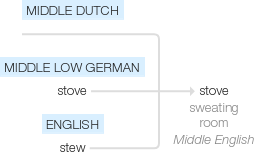Stove
Middle English (in the sense ‘sweating room’): from Middle Dutch or Middle Low German stove ; perhaps related to the noun stew1. Current verb senses date from the early 17th century.
wiktionary
From Middle Dutch stove and/or Middle Low German stove (compare Dutch stoof), possibly from Proto-Germanic *stubō(“room, living room, heated room”), possibly from Vulgar Latin *extūfa, *extūfāre(“to heat with steam”), from Latin ex- + *tūfus(“hot vapor”), from Ancient Greek τῦφος(tûphos, “fever”). [1]
Cognate with Old High German stuba (whence German Stube), Old English stofa(“bathroom, bathhouse”), stufbæþ(“hot-air bath”), Old Norse stofa (whence Icelandic stofa(“living room”), Norwegian stove, Danish and Norwegian stue and Swedish stuga). Doublet of stufa.
stove
etymonline
stove (n.)
mid-15c., "heated room, bath-room," from Middle Low German or Middle Dutch stove, both meaning "heated room," which was the original sense in English; a general West Germanic word (Old English stofa "bath-room," Old High German stuba, German Stube "sitting room").
Of uncertain relationship to similar words in Romance languages (Italian stufa, French étuve "sweating-room;" see stew (v.)). One theory traces them all to Vulgar Latin *extufare "take a steam bath." The meaning "device for heating or cooking" is first recorded 1610s.
